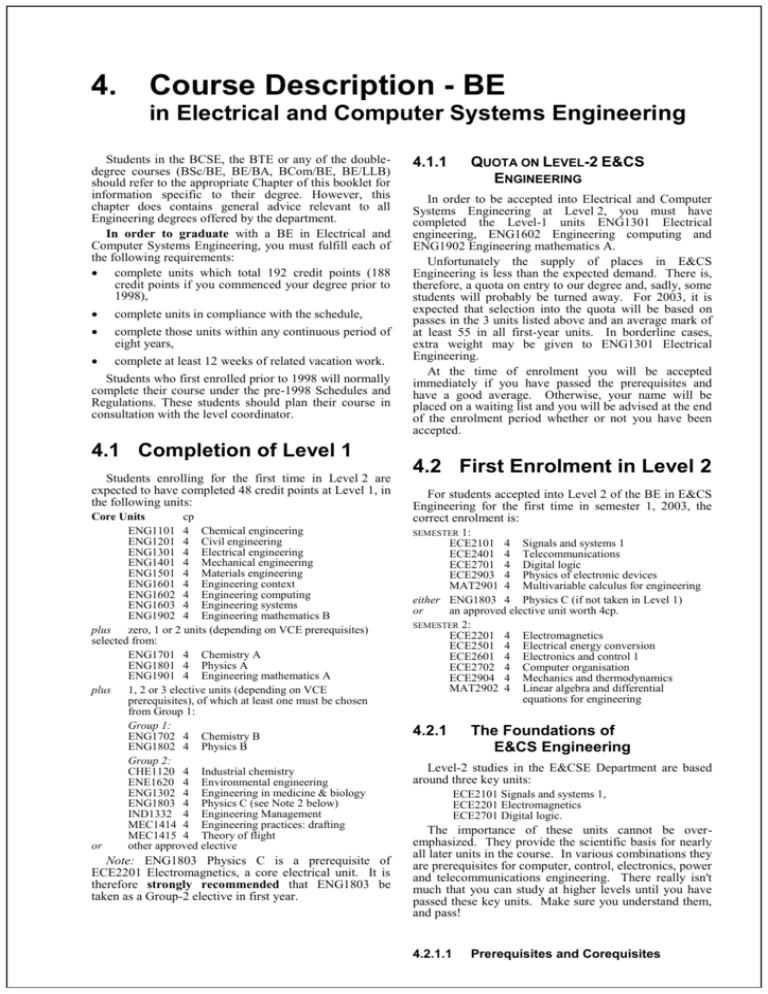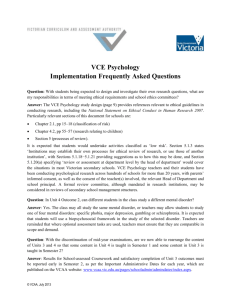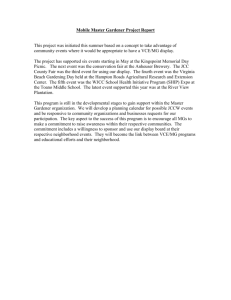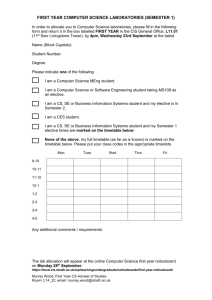4 - Department of Electrical and Computer Systems Engineering
advertisement

4. Course Description - BE in Electrical and Computer Systems Engineering Students in the BCSE, the BTE or any of the doubledegree courses (BSc/BE, BE/BA, BCom/BE, BE/LLB) should refer to the appropriate Chapter of this booklet for information specific to their degree. However, this chapter does contains general advice relevant to all Engineering degrees offered by the department. In order to graduate with a BE in Electrical and Computer Systems Engineering, you must fulfill each of the following requirements: complete units which total 192 credit points (188 credit points if you commenced your degree prior to 1998), complete units in compliance with the schedule, complete those units within any continuous period of eight years, complete at least 12 weeks of related vacation work. Students who first enrolled prior to 1998 will normally complete their course under the pre-1998 Schedules and Regulations. These students should plan their course in consultation with the level coordinator. 4.1 Completion of Level 1 Students enrolling for the first time in Level 2 are expected to have completed 48 credit points at Level 1, in the following units: Core Units cp ENG1101 4 Chemical engineering ENG1201 4 Civil engineering ENG1301 4 Electrical engineering ENG1401 4 Mechanical engineering ENG1501 4 Materials engineering ENG1601 4 Engineering context ENG1602 4 Engineering computing ENG1603 4 Engineering systems ENG1902 4 Engineering mathematics B plus zero, 1 or 2 units (depending on VCE prerequisites) selected from: ENG1701 4 Chemistry A ENG1801 4 Physics A ENG1901 4 Engineering mathematics A plus 1, 2 or 3 elective units (depending on VCE prerequisites), of which at least one must be chosen from Group 1: Group 1: ENG1702 4 Chemistry B ENG1802 4 Physics B Group 2: CHE1120 4 Industrial chemistry ENE1620 4 Environmental engineering ENG1302 4 Engineering in medicine & biology ENG1803 4 Physics C (see Note 2 below) IND1332 4 Engineering Management MEC1414 4 Engineering practices: drafting MEC1415 4 Theory of flight or other approved elective Note: ENG1803 Physics C is a prerequisite of ECE2201 Electromagnetics, a core electrical unit. It is therefore strongly recommended that ENG1803 be taken as a Group-2 elective in first year. 4.1.1 QUOTA ON LEVEL-2 E&CS ENGINEERING In order to be accepted into Electrical and Computer Systems Engineering at Level 2, you must have completed the Level-1 units ENG1301 Electrical engineering, ENG1602 Engineering computing and ENG1902 Engineering mathematics A. Unfortunately the supply of places in E&CS Engineering is less than the expected demand. There is, therefore, a quota on entry to our degree and, sadly, some students will probably be turned away. For 2003, it is expected that selection into the quota will be based on passes in the 3 units listed above and an average mark of at least 55 in all first-year units. In borderline cases, extra weight may be given to ENG1301 Electrical Engineering. At the time of enrolment you will be accepted immediately if you have passed the prerequisites and have a good average. Otherwise, your name will be placed on a waiting list and you will be advised at the end of the enrolment period whether or not you have been accepted. 4.2 First Enrolment in Level 2 For students accepted into Level 2 of the BE in E&CS Engineering for the first time in semester 1, 2003, the correct enrolment is: 1: ECE2101 4 Signals and systems 1 ECE2401 4 Telecommunications ECE2701 4 Digital logic ECE2903 4 Physics of electronic devices MAT2901 4 Multivariable calculus for engineering either ENG1803 4 Physics C (if not taken in Level 1) or an approved elective unit worth 4cp. SEMESTER 2: ECE2201 4 Electromagnetics ECE2501 4 Electrical energy conversion ECE2601 4 Electronics and control 1 ECE2702 4 Computer organisation ECE2904 4 Mechanics and thermodynamics MAT2902 4 Linear algebra and differential equations for engineering SEMESTER 4.2.1 The Foundations of E&CS Engineering Level-2 studies in the E&CSE Department are based around three key units: ECE2101 Signals and systems 1, ECE2201 Electromagnetics ECE2701 Digital logic. The importance of these units cannot be overemphasized. They provide the scientific basis for nearly all later units in the course. In various combinations they are prerequisites for computer, control, electronics, power and telecommunications engineering. There really isn't much that you can study at higher levels until you have passed these key units. Make sure you understand them, and pass! 4.2.1.1 Prerequisites and Corequisites E&CS Engineering is a highly-sequential discipline, with one unit building on another. Sequences may involve 4 or more units, and a hierarchy of prerequisites and corequisites must be enforced if students are to have an adequate foundation to build upon. The course structure is like an upside-down pyramid, standing on its point: at the point would be Kirchhoff’s laws; the next layer would contain concepts such as linearity and Ohm’s law; and so on, upwards and outwards, each layer building on the one below. When one layer is weak, there is a high probability of collapse in the next. The prerequisites for any unit must all be passed before that unit is attempted. A corequisite must either be passed before the unit concerned is attempted, or may be taken concurrently with it. 4.2.1.2 ECE2101 — The Key to Success If one of the Level-2 foundational units deserves special mention, it is ECE2101 Signals and systems 1. Circuit theory, the content of ECE2101, is the very essence of electrical engineering, and ECE2101 is an implied prerequisite for almost all later units in the course. Past experience is that success in these later units is highly correlated with success in ECE2101. You are urged in the strongest possible terms to give this unit your very best. A pass at 50% is really not an adequate foundation to build upon, and is usually a precursor for later failures. You should strive for a credit at the very least. Above all, you should understand what this unit is about — not memorize answers to past exam papers and problem sheets. 4.2.2 OTHER COMPULSORY UNITS The other compulsory units in Level 2 do not all have to be passed (although this is highly desirable!) before you can progress to later-level studies in E&CS Engineering. Units in each level mutually support each other; for example, failure in level-2 electromagnetics and the consequent exclusion from level-3 field theory and electrical power really does make it harder to pass level-3 circuit theory and electronics. Units ECE2401 Telecommunications, ECE2501 Electrical energy conversion, ECE2601 Electronics and control 1, and ECE2702 Computer organisation are not listed among the key units above, only because each has relatively few direct dependents at Level 3. The units are important, they are compulsory, and your options at Level 3 will be restricted until you have passed them. E&CS Engineering relies heavily on mathematics. The level-2 mathematical units MAT2901 Multivariable calculus for engineering and MAT2902 Linear algebra and differential equations for engineering are prerequisites for many level-3 units, and MAT2901 is prerequisite for some level-2 electrical units. Desirably, both mathematics units should be taken in the same calendar year as the level-2 electrical units, with MAT2901 being taken in Semester 1. Many electrical units have a strong basis in physics. ECE2903 Physics of electronic devices and ECE2904 Mechanics and thermodynamics support the level-2 electrical units and, like mathematics, should desirably be taken in the calendar year with them. Physics is prerequisite for all electronics units. 4.2.3 ELECTIVE UNITS There is space in Level 2 for one elective unit, provided ENG1803 has been passed in Level 1. The choice must be approved in writing by the Level 2 Coordinator before you enrol in the unit, otherwise this unit may not be credited towards your degree. You might consider: ENG1302 4 ECE2001 4 Engineering in Medicine & Biology Advanced Engineering 1 4.3 Enrolment in Level 3 4.3.1 FIRST ENTRY TO LEVEL 3. The correct enrolment is: SEMESTER 1: ECE3102 4 Signals and systems 2 ECE3301 4 Control systems 2 ECE3502 4 Power electronics, machines & systems ECE3602 4 Electronics 2 ECE3703 4 Computer engineering MAT3901 4 Statistics & integral transforms for eng. SEMESTER 2: ECE3202 4 Electromagnetic propagation ECE3402 4 Information transmission ECE3603 4 Electronics 3 ECE3704 4 Software engg & real-time systems ECE3905 4 Design ECE3907 4 Engineering management A 4.4 Enrolment in Level 4 4.4.1 CORE UNITS All students are required to complete the following units: ECE4705 4 Computer architecture (Sem 1) ECE4908 4 Engineering management B (Sem 1) ECE4909 12 Thesis project 4.4.2 ELECTIVE UNITS In addition, you must complete 28 credit points selected from the elective units shown below (each unit is worth 4cp). Students may select a maximum of five electives from a particular specialist unit group, where the group is denoted by the second digit of the unit numbering. Prerequisite, corequisite and prohibition requirements must be met in order to enrol in an elective. One of the elective units may, with written approval of the Head of Department, be a unit chosen from elsewhere in the University, where the unit does not substantially duplicate material already studied. ENG4614 Schools technology studies project may be taken only as the nonstandard elective. Note that some elective units may be cancelled if insufficient students enrol; you should plan at least one spare elective, in case this happens to one of your preferences. 4.4.2.1 E&CSE Electives Sem Unit code 1 ECE4203 1 ECE4204 2 ECE4205 1 ECE4302 n.o. ECE4303 n.o ECE4304 2 ECE4305 2 ECE4306 1 ECE4403 2 ECE4404 2 ECE4405 1 ECE4406 2 ECE4410 1 ECE4411 2 ECE4412 1 ECE4413 2 ECE4414 2 ECE4415 1 ECE4416 2 ECE4420 Unit name Antennas and propagation Microwave/RF devices, circuits & comms Electromagnetic compatibility Modern control systems Advanced control systems Computer control Industrial control and automation Mechanoinformatics Signal processing Digital signal processing Optical communication systems Digital transmission Software engineering for telecom. Internet architectures and protocols ATM and ISDN networks Mobile systems and networks Performance of telecomm networks Video communications Appln of high speed telecom networks Avionics 1A 1 1 2 n.o. 2 n.o. 2 n.o. 2 1 n.o. 2 1 n.o. n.o. 1 2 2 ECE4503 ECE4504 ECE4505 ECE4506 ECE4507 ECE4508 ECE4509 ECE4510 ECE4603 ECE4604 ECE4605 ECE4606 ECE4607 ECE4706 ECE4707 ECE4708 ECE4709 ECE4710 2 2 n.o. n.o. n.o. n.o. 2 2 1 1 n.o. ECE4711 ECE4712 ECE4713 ECE3801 ECE3802 ECE3803 ECE4804 ECE4805 ECE4806 ECE4807 ECE4901 4.4.3 Electrical energy systems Electrical conversion systems Power electronics applications Variable speed motor drive systems Energy supply, demand & the environment High voltage systems and protection Reliability engineering Distribn & utilisation of electr. Energy Adv. electronic & photonic devices Large scale digital design Audio systems Radio frequency design Electronic systems and components Advanced computer architecture Neural computing Evolutionary computing Advanced programming techniques Computer image processing and pattern recognition Computer vision and robotics Interactive computer graphics Computer systems design Bioelectricity Medical instrumentation Clinical engineering management Biomechanics Medical signal processing Medical imaging Biomedical eqpt design,dev.& innovation Computational methods THESIS PROJECT The Thesis project, ECE4909, normally runs throughout the year, and is worth one quarter of your level 4 assessment. As such, you should devote at least 12 hours/wk to the unit over the entire year. There are a number of milestones along the way. These should assist you in planning your project to ensure that satisfactory progress is maintained through the year. Appendix E describes the requirements in more detail and is essential reading. The prerequisite for any thesis project is that Level 3 should be “substantially complete”. This is interpreted as: Level 1 and Level 2 complete, plus at least 40 points which count towards the degree from Level 3. Students who intend to finish their degree at mid-year, at the end of Semester 1, or who have a very light workload in first semester and are able to devote substantial effort to the project over the summer break, may undertake a concentrated single-semester thesis, ECE4910.12 Thesis project sem1 Due to the difficulty in completing a thesis in one semester, the topic must be chosen by the end of the preceding year and work must be commenced during the long summer vacation. 4.5 Mixed-Level Enrolments If you need to enrol in units from a mixture of levels, then no detailed advice can be given, particularly with the introduction of the new course. You must first consult the Coordinator for the lowest-level unit in which you wish to enrol. In general you should aim for an enrolment that allows you to progress along a sequence of units for which you have passed the prerequisites. Go through the units as listed in the Schedule (see Section 4.6), and check what can be fitted into your timetable without clashes. You must discuss your choice of enrolment with a Level Coordinator, as you need written permission to vary a course from the Faculty’s published Schedule. You must adhere to prerequisites and corequisites. No-one except the Level Coordinator for the level of any unit has authority to waive prerequisites — don’t waste time asking other staff members. Notice that, although attendance at lectures is not compulsory, attendance at laboratory classes in Engineering is compulsory; a timetable clash is no excuse for non-attendance or abbreviated attendance at the laboratory. Repeat students will not be granted laboratory exemption under any circumstances. 4.5.1 OVERWEIGHT COURSES The normal load for an engineering student is 24 credit points per semester. When a student fails a unit, there is a temptation to go overweight in a following semester, in an attempt to “catch up” by repeating the unit without dropping something else. The statistics are that this strategy almost never succeeds; another unit is failed (often several units), and the final situation is worse than the first. If you have failed while taking a normal load, you are more likely to fail under overload. If you have failed one or two units, it is far better to go underweight and add one semester to your course duration. Work out how many credit points you need to complete the course, divide by the number of semesters remaining (including the one extra), and aim to distribute all units (including the repeat) evenly. This advice is not given lightly. The Department is mindful of the cost to the student, in time, money and other hardships. Nevertheless the advice is given, because it has proved to be the best. If you have failed more than two units, you should consider adding a full year to the duration of your course. 4.5.2 STUDENTS COMMENCING PRIOR TO 1998 Students who first enrolled in Engineering in 1998 or later are subject to the Schedules and Regulations of the new course. However, students who enrolled prior to 1998 will normally complete their course under the pre-1998 Schedules and Regulations. These students should plan their course using the equivalence tables in the 2002 Undergraduate Handbook (Blue Book) but you must discuss your situation with your Level Coordinator. Be cautioned that some of the old units, which you may already have passed, carry fewer credit points than their substitutes; they may not provide adequate preparation for later-year units in the new course. 4.6 Schedule of Units 2003 - BE in Electrical and Computer Systems Engineering Where a unit is listed as having one or more pre-requisites, these must all be passed before the unit may be commenced. Where a unit is listed as having one or more co-requisites, these may either be taken concurrently with the unit or be completed before the unit is commenced. NOTE: Some electives are not offered (n.o.) in 2003. Sem Unit No. Cp Name Pre-Requisite(s Co-Requisite(s) Basic computer familiarity assumed VCE Specialist Mathematics 3/4 or ENG1901 VCE Specialist Mathematics 3/4 or ENG1901 ENG1902 ENG1902 - VCE Mathematical Methods 3/4 VCE Mathematical Methods 3/4 VCE Chemistry 3/4 VCE Physics 3/4 - Prohibitions Level 1 1,2 ENG1101 4 Chemical engineering 1,2 ENG1201 4 Civil engineering 1,2 ENG1301 4 Electrical engineering 1,2 ENG1401 4 Mechanical engineering 1,2 ENG1501 4 Materials engineering 1,2 ENG1601 4 Engineering context 1,2 ENG1602 4 Engineering computing 1,2 ENG1603 4 Engineering systems 1,2 ENG1902 4 Engineering mathematics B None, one or two units (depending on prerequisites) selected from: 1 ENG1701 4 Chemistry A 1,2 ENG1801 4 Physics A 1,2 ENG1901 4 Engineering mathematics A Elective units One, two or three units (depending on prerequisites), of which at least one must by chosen from group 1: Group 1: 1,2 ENG1702 4 Chemistry B VCE Chemistry 3/4 or ENG1701 1,2 ENG1802 4 Physics B VCE Physics 3/4 or ENG1801 Group 2: 1,2 CHE1120 4 Industrial chemistry VCE Chemistry 3/4 or ENG1701 1.2 ENE1620 4 Environmental engineering 2 ENG1302 4 Engineering in medicine and biology ENG1701 if VCE Chemistry 3/4 not completed 1,2 ENG1803 4 Physics C VCE Physics 3/4 or ENG1801 ENG1901 if VCE Spec Maths 3/4 not completed 1 MEC1414 4 Engineering Practices: Drafting Other approved electives worth not less than 4 cp, which may include later year units for which prerequisites have been satisfied. For example, the following units have already received departmental approval: 1 MEC2414 4 Engineering practices: drafting 1 MEC2430 4 Fluid mechanics VCE Specialist Mathematics 3/4 or ENG1901 2 MTE2506 4 materials selection & manufacturing ENG1501 - Level 2 1,2 2 1 2 2 ECE2101 ECE2201 ECE2401 ECE2501 ECE2601 4 4 4 4 4 Signals and systems I Electromagnetics Telecommunications Electrical energy conversion Electronics and control I ENG1301, ENG1603 MAT2901, ENG1803 ENG1301 ECE2101 ECE2101, MAT2901, ECE2903 ENG1803, MAT2901 ECE2201 MAT2902 4 Department of Electrical & Computer Systems Engineering Undergraduate Handbook 2003 Sem Unit No. Cp Name Pre-Requisite(s Co-Requisite(s) Prohibitions 1,2 ECE2701 4 Digital logic 2 ECE2702 4 Computer organisation ENG1602 ECE2701 1 ECE2903 4 Physics of electronic devices ENG1803 2 ECE2904 4 Mechanics and thermodynamics ENG1401 1* MAT2901 4 Multivariable calculus for engineering ENG1902 ENG1603 2* MAT2902 4 Linear algebra & differential equations for engg ENG1902 ENG1603 If not taken in first year: 1,2 ENG1803 4 Physics C VCE Physics 3/4 or ENG1801 VCE Specialist Mathematics 3/4 or ENG1901 or xxxxxxx 4 Elective unit as approved by the department * although these units are available in both semesters, special permission is required from the second year coordinator if you wish to take either of these units in other than the semester listed above. Level 3 1 ECE3102 2 ECE3202 1 ECE3301 2 ECE3402 1 ECE3502 1 ECE3602 2 ECE3603 1 ECE3703 2 ECE3704 2 ECE3905 2 ECE3907 1 MAT3901 4 4 4 4 4 4 4 4 4 4 4 4 Signals and systems 2 ECE2101 Electromagnetic propagation ECE2101, ECE2201, MAT2901 Control systems 2 ECE2601, MAT2902 Information transmission ECE2401, ECE3102, MAT3901 Power electronics, machines & systems ECE2501 Electronics 2 ECE2601 Electronics 3 ECE3102, ECE3602 Computer engineering ECE2701,ECE2702 Software engg & real-time systems ECE2702 Design any 2 of (ECE3301, ECE3502, ECE3602, ECE3703) Engineering management A Statistics and integral transforms for engineering MAT2901, MAT2902 MAT3901 ECE3102 - both of ECS3311 and ECS3312 ECS3321 ECS3331 ECS3341 ECS3501 ECS3362 ECS3361 ECS3371 ECS3381 ECS3391 ECS3392 both of MAT3910 and MAT3920 4 4 Computer architecture Engineering management B ECE3703 ECE3907 - ECS4373 ECS4393 12 Thesis project level 3 substantially complete - - 12 Thesis project Sem1 level 3 substantially complete - - Level 4 Core Units: 1 ECE4705 1 ECE4908 either yr ECE4909 or 1 ECE4910 Electives: Availability of some units will depend upon sufficient enrolments. Unforeseen staff movements may also result in cancellation of some units. 1 ECE4203 1 ECE4204 2 ECE4205 1 ECE4302 n.o. ECE4303 n.o. ECE4304 2 ECE4305 2 ECE4306 1 ECE4403 2 ECE4404 4 4 4 4 4 4 4 4 4 4 Antennas and propagation Microwave/RF devices, circuits & commun. Electromagnetic compatibility Modern control systems Advanced control systems Computer control Industrial control and automation Mechanoinformatics Signal processing Digital signal processing ECE3202 ECE3202, ECE3603 ECE3202, ECE3603 ECE3301 ECE3301 ECE3301 ECE3301 ECE3703 ECE3102, MAT3901 ECE3102, ECE3703 - 5 ECS4322 ELE4241 ELE4231,ECS4332 ECS4313 ELE4282 ,ECE4805 Department of Electrical & Computer Systems Engineering Undergraduate Handbook 2003 Sem Unit No. Cp 2 ECE4405 4 1 ECE4406 4 2 ECE4410 4 1 ECE4411 4 2 ECE4412 4 1 ECE4413 4 2 ECE4414 4 2 ECE4415 4 1 ECE4416 4 2 ECE4420 4 1 ECE4503 4 1 ECE4504 4 2 ECE4505 4 n.o. ECE4506 4 2 ECE4507 4 n.o. ECE4508 4 2 ECE4509 4 n.o. ECE4510 4 2 ECE4603 4 1 ECE4604 4 n.o. ECE4605 4 2 ECE4606 4 1 ECE4607 4 n.o. ECE4706 4 n.o. ECE4707 4 1 ECE4708 4 2 ECE4709 4 2 ECE4710 4 2 ECE4711 4 2 ECE4712 4 n.o. ECE4713 4 n.o. ECE3801 4 n.o. ECE3802 4 n.o. ECE3803 4 2 ECE4804 4 2. ECE4805 4 1 ECE4806 4 1 ECE4807 4 n.o. ECE4901 4 Name Optical communication systems Digital transmission Software engineering for telecommunications Internet architectures and protocols ATM and ISDN networks Mobile systems and networks Performance of telecommunication networks Video communications Applicn of high speed telecomm. networks Avionics 1A Electrical energy systems Electrical conversion systems Power electronics applications Variable speed motor drives Energy supply, demand and the environment High voltage systems and protection Reliability engineering Distribution and utilisation of electrical energy Advanced electronic and photonic devices Large scale digital design Audio systems Radio frequency design Electronic systems and components Advanced computer architecture Neural computing Evolutionary computing Advanced programming techniques Computer image processing & pattern recogn Computer vision and robotics Interactive computer graphics Computer systems design Bioelectricity Medical instrumentation Clinical engineering management Biomechanics Medical signal processing Medical imaging Biomedical equipt design, developt & innovn Computational methods Pre-Requisite(s ECE3402 ECE3402 ECE2401, ECE3704 ECE2401 ECE2401 ECE3202, MAT3901 ECE2401 ECE4403 ECE2401 ECE3202 ECE2501 ECE3502 ECE3502 ECE3502 ECE2501 MAT3901 ECE3502 ECE3202,ECE3603 ECE2601,ECE3703 ECE3102,ECE3603 ECE3202,ECE3603 ECE3603 ECE4705 ECE2702 or CSE1303 ECE2702 or CSE1303 ECE2702 or CSE1303 ECE2702 or CSE1303, MAT2902 ECE2702 or CSE1303 level 3 subst complete ECE3703 PHY2011, ECE2601 PHY2011, ECE2601 Level 2 of BE/BSc(Physiology) subst. compl. ENG1401 ECE3102,ECE3703 ENG1803 or PHS1022 level 3 subst complete ECE3202, MAT3901 Co-Requisite(s) ECE3801 - Prohibitions ECS4323 ECS4344 ,ELE4242 ECS4348 ELE4271 ,ECS3343,TEC3742 ECS4346 ,ELE4272,TEC3742 ECS4345 ECS4347 ECS4349 ECE4421 ECS4353,ELE4251 ECS4354 ECS4357,ELE4262 ECS4356 ELE4252,ECS4355 ECS4359 ECS4358 ECS4365 ECS3363,ELE4292 ECS4368 ELE4092 ECS4367 ECS3372 ECS4378 ECS4379 ECS3383 ECS4387 ECS3382 ECS4374 ECE4812, ECS3315 ECE4811, ECS3316 ECS3398 ECS4302 ECS4317,ECE4404,ELE4282 ECS4388 ECS4391 ECS4385 n.o. = not offered in 2003 6 Department of Electrical & Computer Systems Engineering Undergraduate Handbook 2003 Bachelor of Engineering in Electrical and Computer Engineering Level 1 Level 2 Semester 1 Core s ubjects required for progress ion to Level 2: Level 3 Semester 2 ECE2101 Signals & s ys tems 1 Semester 1 Level 4 Semester 2 Semester 1 Semester 2 ECE3102 Signals & s ys tems 2 ECE3202 Electromagnetic propagation ECE2201 Electromagnetics ECE3301 Control systems 2 ECE3402 Information trans mis sion ECE2401 Telecommunications ENG1301 Electrical eng ECE2501 Electrical energy conversion ECE3502 Power electronics, machines & sys ECE2601 Electronics & control 1 ECE3602 Electronics 2 ECE2701 Digital logic ENG1603 Eng s ys tems MAT2902 Linear alg & DEs ENG1802 # Physics B elective: ECE3704 S/W eng & realtime sys MAT2901 Multivar calc for eng ENG1902 Eng maths B ENG1801 Physics A or VCE Physics ECE4705 Computer architecture ECE3703 Computer eng ECE2702 Computer organisn ENG1602 Eng computing ENG1901 Eng maths A or VCE Spec Maths ECE3603 Electronics 3 ECE2903 Physics of electr devices (any 2 of) plus either ECE3905 Des ign ECE3907 Eng management A *ENG1803 Physics C ENG1803 Physics C MAT3901 Stats & intl trans f or ENG1401 Mechanical eng Other Core firs t year s ubjects: ENG1501 Materials eng ENG1601 Eng context ENG1701 Chemis try A or VCE Chemistry ENG1101 Chemical eng ECE4908 Eng management B ECE4909 /10 Thesis Project other elective ECE2904 Mech and thermo = prerequis ite Electives (28 cp) = corequis ite ENG1201 Civil eng * = if not taken at level 1 #= mus t take ENG1702 and/or ENG1802 ENG1702 # Chemistry B 7 Smm 13/8/2002 Department of Electrical & Computer Systems Engineering Undergraduate Handbook 2003 8






